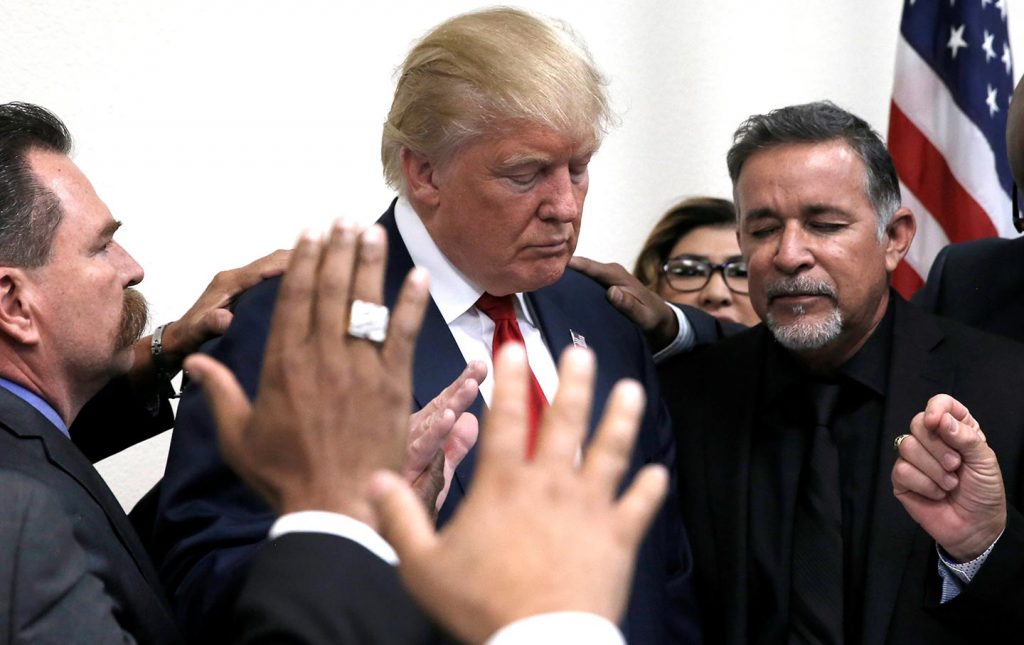Blog Post
Dr. Robert P. George explains why many Catholics and evangelicals support Donald Trump
I’ve been wondering for some time what the great Princeton professor Robert P. George thinks of the evangelical war over Trump triggered by the Christianity Today op-ed calling for his removal. George is one of the most intelligent, principled, and level-headed minds in America, and he’s written many books on religious liberty, freedom of conscience, and other issues extremely relevant to this ongoing discussion. He recently posted his views to Facebook, and I found them both interesting and helpful:
Whatever one thinks of Donald Trump (and my own views about the President’s delinquencies are well known) surely it’s not hard to understand why large numbers of Evangelicals and Catholics favor him over any of the Democrats seeking their party’s nomination (despite the fact that many Evangelicals and Catholics aren’t happy about the President’s character, coarse rhetoric, and some of his polices). There is the fealty of every single one of the Democratic nominees–every single one–to the abortion and sex lib lobbies. If you believe, as Evangelicals and Catholics believe, that abortion is the unjust killing of innocent and defenseless members of the human family, then it is nigh impossible to imagine circumstances under which one could support a politician who pledges to work night and day to deny unborn children any legal protection against the lethal violence now visited with impunity upon nearly a million of them each year. And that is precisely the pledge every Democratic candidate makes to Planned Parenthood, NARAL, and the entire base of their party. But that’s only for starters.
Evangelicals and Catholics have watched as Democrats and progressives across the country have worked to shut down Catholic and other religious foster care and adoption agencies because, as a matter of conscience, these agencies place children in homes with a mom and a dad. They have watched as cake bakers, florists, caterers, wedding planners, and others (even the pizza shop-owning O’Connor family ad the software designer Brendan Eich) have been harassed in efforts to drive them out of business and deprive them of their livelihoods because of their beliefs about marriage and sexual morality. They have watched as the Democratic and progressive mayor of Atlanta terminated the employment of Kelvin Cochran, the city’s Fire Chief, for the same reason–he had published a book upholding Biblical teaching on marriage and sexual morality. They have watched as Democrats and progressives have tried to “cleanse” entire fields of medicine and healthcare of Evangelicals, Catholics, and other pro-life people by imposing on them requirements to implicate themselves in the taking of innocent life by abortion. They watched as Beto O’Rourke proposed–over no truly meaningful opposition from his fellow Democratic presidential aspirants–to selectively yank the tax exempt status from churches and othere religious organizations that refused to fall in line with progressive ideological orthodoxy on sex and marriage.
I could go on.
Now, none of this is to deny that there are some Evangelicals and Catholics (and other Trump supporters) who seem entirely to overlook Donald Trump’s faults and failings. They see nothing but good in the man. But at least in my experience these Evangelicals and Catholics are in the minority. Most recognize his faults and failings and wish he were better. Their support for him is based on a prudential judgment that the overall situation for the common good would be made much worse if he were to lose to one of the Democrats. And they fear–with justification–that the consequences for themselves and their religious institutions would be dire if such a thing were to happen. In this respect, their position is formally like that of their anti-Trump co-religionists who favor a Democrat because their prudential judgment is that, though a Democratic president would do great harm to values they cherish (such as the sanctity of human life, and religious liberty and the rights of conscience), the harm would be less than the harm Trump will do to those values and others in the long run.
My point here is not to try to adjudicate this dispute. (For what it’s worth, I think that it’s a more complicated business than most people on either side suppose. I may say more about that on another occasion after I’ve reflected on it a good deal more.) It is simply to say that no one should be surprised that many Evangelicals and Catholics (including some like my pal Keith Pavlischek who refused to vote for Trump in 2016) support the President over the Democratic alternatives. Whether one assesses and weights the reasons as they do or not, they do have reasons.
I concur with George’s analysis, and I’ve made that point that very few pro-life and pro-family leaders were enthusiastically for Trump rather than against Hillary several times. I’d be interested to know if George sees any long-term damage to the movement from the transactional trade-off many of the leaders are engaging in for the reasons he delineates above.









“Most recognize his faults and failings and wish he were better. Their support for him is based on a prudential judgment that the overall situation for the common good would be made much worse if he were to lose to one of the Democrats. And they fear–with justification–that the consequences for themselves and their religious institutions would be dire if such a thing were to happen. In this respect, their position is formally like that of their anti-Trump co-religionists who favor a Democrat because their prudential judgment is that, though a Democratic president would do great harm to values they cherish (such as the sanctity of human life, and religious liberty and the rights of conscience), the harm would be less than the harm Trump will do to those values and others in the long run.”
Dr. George may be unwilling to ‘adjudicate’ this dispute, but I’m not. ANYONE who believes that the PERSONAL failings of a single president can equal — let alone outweigh — the effects of PUBLIC POLICY on a culture’s moral values is a fool.